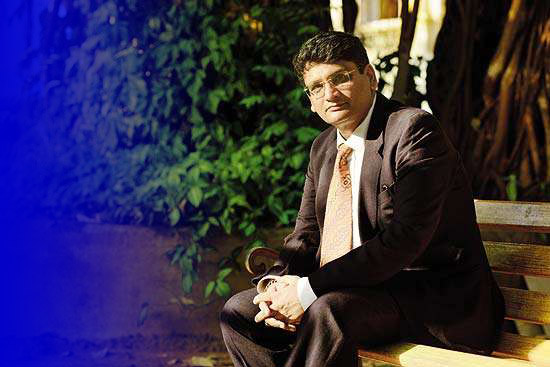Freeloading Promoters ~ Love the RBI Governor,Raghuram Rajan’s Strong Speech at the Third Verghese Kurien Lecture at the Institute of Rural Development Anand yesterday
…resonates with the tagline of my blog “In India, Companies may fall sick but Promoters rarely do !”
Here are some superb extracts from the Address as linked above
” The Promoter enjoys riskless capitalism -even in these times of very slow growth,how many large promoters have lost their homes or have had to curb their lifestyles despite offering personal guarantee to lenders?”
“We need a change in mindset, where the wilful or non-cooperative defaulter is not lionized as a captain of industry, but justly chastised as a freeloader on the hardworking people of this country,”
“In India, too many large borrowers insist on their divine right to stay in control…”
“…the promoter threatens to run the enterprise into the ground unless the government, banks, and regulators make the concessions that are necessary to keep it alive. And if the enterprise regains health, the promoter retains all the upside….!
“No wonder government ministers worry about a country where we have many sick companies but no “sick” promoters.”
“I also don’t want to argue against risk taking in business. If business does not take risks, we will not get architectural marvels like our new international airports, the “developed-for-India” low cost business model in the telecom sector, or our world class refineries. Risk taking inevitably means the possibility of default. An economy where there is no default is an economy where promoters and banks are taking too little risk. What I am warning against is the uneven sharing of risk and returns in enterprise, against all contractual norms established the world over – where promoters have a class of “super” equity which retains all the upside in good times and very little of the downside in bad times, while creditors, typically public sector banks, hold “junior” debt and get none of the fat returns in good times while absorbing much of the losses in bad times.
“The public believes the large promoter makes merry because of sweet deals between him and the banker. While these views have gained currency because of recent revelations of possible corruption in banks, my sense is that Occam’s Razor suggests a more relevant explanation – the system renders the banker helpless vis-a-vis the large and influential promoter.”
“Who pays for this one way bet large promoters enjoy? Clearly, the hard working savers and taxpayers of this country! As just one measure, the total write-offs of loans made by the commercial banks in the last five years is 161018 crore, which is 1.27% of GDP. Of course, some of this amount will be recovered, but given the size of stressed assets in the system, there will be more write-offs to come. To put these amounts in perspective – thousands of crore often become meaningless to the lay person – 1.27% of GDP would have allowed 1.5 million of the poorest children to get a full university degree from the top private universities in the country, all expenses paid.”
“Since the unscrupulous promoter hides among the scrupulous ones, every businessperson is tainted by the bad eggs in the basket.”
“The SARFAESI Act of 2002 is, by the standards of most countries, very pro-creditor as it is written. This was probably an attempt by legislators to reduce the burden on DRTs and force promoters to pay. But its full force is felt by the small entrepreneur who does not have the wherewithal to hire expensive lawyers or move the courts, even while the influential promoter once again escapes its rigour. The small entrepreneur’s assets are repossessed quickly and sold, extinguishing many a promising business that could do with a little support from bankers.”
“When some businessmen enjoy a privileged existence, risking other people’s money but never their own, the public and their representatives get angry.”
” And some promoters find ways to take out the equity as soon as the project gets going, so there really is no cushion when bad times hit.”
“The system also needs professional turn-around agents who can step in the place of promoters. Asset Reconstruction Companies (ARCs) were meant to do this, but they need more capital and better management capabilities. Also, there is a requirement that they hand the enterprise back to the original promoter once they have generated enough value to repay the original debts. Such a requirement is misconceived and needs to be repealed, else ARCs have little incentive to spend effort and money to turn around firms. They will simply be liquidators, as they have largely proven to be so far. I should mention that the RBI is open to more firms applying for licenses as ARCs.”
“Today, the market does not distinguish much between non-performing loans and restructured loans, preferring to call them both stressed loans and discounting bank value accordingly. Mutilating Shakespeare, an NPA by any other name smells as bad! Indeed, because forbearance makes bank balance sheets opaque, they may smell worse to analysts and investors. The fundamental lesson of every situation of banking stress in recent years across the world is to recognize and flag the problem loans quickly and deal with them. So regulatory forbearance, which is a euphemism for regulators collaborating with banks to hide problems and push them into the future, is a bad idea.”
“… Or put differently, forbearance is ostrich-like behaviour, hoping the problem will go away. It is not realism but naiveté, for the lesson from across the world is that the problems only get worse as one buries one’s head in the sand.”
“Perhaps the reason we have been so willing to protect the borrower against the creditor is that the hated moneylender looms large in our collective psyche. But the large borrower today is not a helpless illiterate peasant and the lender today is typically not the sahukar but the public sector bank – in other words, we are the lender. When the large promoter defaults wilfully or does not cooperate in repayment to the public sector bank, he robs each one of us taxpayers, even while making it costlier to fund the new investment our economy needs.”
Wow !


1 thought on “Freeloading Promoters ~ Loved this Address by the RBI Governor Raghuram Rajan”
Thanks for the extracts.